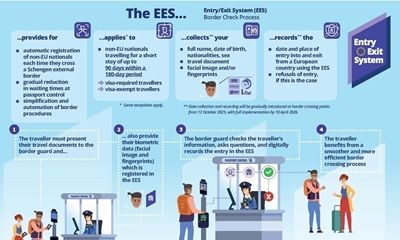Note: UK VAT paid boats that were in the EU on 31 December 2020 23:00 UTC and did not lose that status afterwards are considered as EU VAT paid boats. A boat can lose its EU VAT paid status if it left the EU for a period of three years or longer, or was sold while outside the EU.
Temporary Admission (TA) is a means of entry for foreign boats for limited periods without the need for formal importation and customs duties.
EU VAT paid boats: no Temporary Admission required
During a spot check, customs officials may assume, because you fly a non-EU flag, that your boat is not EU VAT paid. They can also ask you to sign a “TA form”.
If your boat is EU VAT paid, you should not sign such a form and instead show them the original VAT invoice or other documents evidencing the EU VAT paid status. On that basis, the TA restrictions do not apply to your boat. Your boat can stay indefinitely within the EU and retains the EU VAT paid status if it is sold whilst within the EU to anyone else. Signing the TA form may mean that customs will try to enforce the 18-months restriction imposed by the TA regime on your boat, which would be incorrect in this case.
Non-EU VAT paid boats: Temporary Admission
Temporary Admission regime
If your boat is not EU VAT paid (this includes boats that are UK VAT paid but were in the UK on 31 December 2020 23:00 UTC) you may cruise in EU waters for a period of up to 18 months each time without incurring EU VAT (and customs duties). This assumes you are indeed only intending to be temporarily in EU waters. If you intend to use the boat permanently in the EU, you need to declare the boat and pay VAT (and possibly customs duties, depending on the origin of the boat) upon first import.
If you are temporarily in the EU, you do that under the customs regime of “Temporary Admission” (TA). You do not have to apply for this regime. It is automatically granted when you cross the EU outer sea border. You must still use a Port of Entry where this is required, but to declare crew for immigration purposes and goods rather than the vessel. (If you have goods to declare, eg. alcohol or tobacco in excess of the allowances, you must alert local customs).
EU TA is only available to non-residents of the EU. Nationality of the owner or boat registration is not relevant.
Temporary Admission into the UK
UK VAT paid boats: no Temporary Admission is required into the UK.
Non-UK VAT paid boats: Temporary Admission into the UK: The rules are similar to these for the EU: there is no port of entry requirement, but vessels must follow the rules from Border Force, as set out here. A UK resident cannot bring a non-UK VAT paid boat in the UK under Temporary Admission; they must declare the boat for importation.
Consequences of overstaying
If the boats overstays the 18-months period, local VAT will be charged on the value of the boat. Depending on the circumstances, this may be the value at the date of the original entry or the date the overstay starts.
EU TA form
Normally there is no documentation required for Temporary Admission; it is up to the skipper to keep good, long-term records and make them available as required. However, RATS have received reports where customs officials ask members to sign an EU TA form that certifies that the boat owner is aware of the 18-months period and is asked to provide an estimated value of the boat. The suggestion is that if the boat is found to be overstaying, local VAT will be charged on the value given. Although this is a form, it is technically defined as a record of an “oral declaration” of the TA regime.
If you are asked to sign this form, you could point out that no application is necessary, as the simple act of crossing the outside EU border is sufficient for the TA regime. Signing the form is therefore not required to benefit from the TA regime. RATS is unclear what the response by customs officials will be if you refuse to sign the form, so would not advise you to refuse. In any case it is prudent to be very careful with giving an estimated value of the boat, as that will be the starting point of any valuation discussion when the TA would be considered to be no longer appllicable.
Resetting the clock
When you next leave the EU, the TA stops. By leaving the EU, you can reset the TA clock. In principle, you might just “show evidence” that your boat has left EU waters and, importantly, of the date thereof. There is unfortunately no formal guidance given on such “evidence” and some people have suggested work-arounds such as photos of buoys or chartplotter positions. It is uncertain whether a simple photo of a buoy outside the EU’s waters will be considered as sufficient evidence. At the minimum it would have to show that it is indeed your boat and at what date the boat was there. RATS is aware that generic photos of such buoys are circulating in the boating community and customs officials may be suspicious of such “evidence”. Our advice to owners is therefore that they need to be aware of the risks that this entails. The interpretation of the rules varies across countries and between customs officials. The problem is that at any future time, in any EU country, a customs official might decide not to accept the “evidence” that you relied upon, and VAT might become due. In addition, when you sell the boat a purchaser will understandably be cautious about purchasing a boat without clear evidence, and may not purchase or seek a price reduction.
Given the potential financial impact if your evidence is not accepted, RATS advises that owners should always seek to obtain clear documentary evidence that the boat has left, and in RATS’ view the clearest evidence is at least a mooring invoice of a marina outside the EU, customs stamp or similar document from outside the EU territory, clearly stating the name of your boat and the date it was there.
RATS is aware of people doing otherwise, but it believes there are long term risks associated with this.
Maximum 10 year limit to TA periods
In 2016 the EU set a maximum term of the TA for 10 years. Although the relevant provisions may perhaps be interpreted otherwise, EU customs authorities now appear to take the position that this applies to the aggregate TA periods of a specific boat, irrespective of the owner.
This means that a non-EU VAT paid boat may over its total life time only be in EU waters under the TA regime for an aggregate maximum period of 10 years. All individual TA periods would need to be added up. For a boat that was UK VAT paid and not in the EU on 31 December 2020 the 10-year term would start with any TA period after 31 December 2020 (as it became non-EU VAT paid only on that date).
It is currently unclear how this maximum period will be enforced by customs officials as they would have to be aware of all stays of a particular boat within EU waters and keep track of name changes etc. However, RATS has received a report of Dutch customs, during a spot check, referring to the 10 years period and recording the presence of UK yachts in Dutch waters based on AIS tracks, records of customs spot checks and sightings. In countries like Italy, Greece and Spain, harbour records (and/or transit logs) are generally more formally kept and enforcement may be easier in practice.
It is likely that as 2026 is approaching (10 years after the date of entry into force of 2016), customs will look more closely at this topic.
If you are spot checked and the customs officials have no record of your date of entry, they seem to take the date of the spot check as the starting date of the TA period. If you leave EU waters but are not checked when leaving, you should retain evidence of the date your left, as this also stops the 10-year clock.
If you buy a second hand boat that has been in the EU since 2016 under various TA periods, be aware that these periods will reduce the available TA periods for you. So it is useful to enquire about this with the seller and assess the quality of the evidence on TA for the boat.
If the 10 years period lapses, the boat will either have to leave the EU or the owner will have to declare the boat to customs and pay the VAT on the value then.
Buying a boat for predominant use in EU waters
More generally, if you buy a boat and you expect to be predominantly using it within EU waters, it makes sense to look, if available, for an EU VAT paid boat (and buy it whilst it is within the EU), so that you do not have any practical restrictions caused by the limitations of the TA regime. (Note that a sale of such a boat outside the EU will lead to the loss of the EU VAT paid status). If you, as a UK resident, buy an EU VAT paid boat you will, however, not be able to bring the boat into the UK without incurring UK VAT.
Non-UK residents can enter the UK under its own, separate TA provisions. We have not heard any explicit suggestion of a maximum TA term being applied by the UK authorities.
For the avoidance of doubt, the EU maximum 10 year TA period should not be an issue for:
- UK berthed boats that occassionally enter EU waters;
- Boats that have EU VAT paid status.
- Boats that are permanently berthed in EU waters;
- Boats that are berthed elsewhere but are very often mostly cruising in the EU, based on TA periods of 18 months that are, as standard practice, reset every 18 months. How this will be enforced in practice is, however, a big question mark.
Record keeping
There is no formal obligation that RATS is aware of for an owner to keep accurate records for VAT purposes for privately owned pleasure craft. But Customs can rely on any other data they can access.
It is, however, in your interest to keep accurate records of your time in EU waters. If you are spot checked by customs, your presence will have been recorded but your exit may not have been. It is therefore in your interest to keep accurate records of the moment you leave the EU waters again, so as to avoid a misunderstanding that your boat overstayed and to minimise your time in the EU counting towards the 10 year period.
More general info on VAT (member only page, you will need to be logged in to access the page).
Letting us know about your experiences
If you have any recent practical experience with customs checks related to TA (and/or their acceptance of “resetting the clock”), RATS reiterates its request to let RATS know, for the benefit of all members. Please then send an email to RATS@theca.org.uk.
The Regulatory & Technical Services group (RATS) is an executive committee of the Cruising Association (CA) made up of CA volunteers. RATS gives advice and assistance to CA members and others on a voluntary basis but this is subject to the following Disclaimer and should not be regarded as a substitute for appropriate professional advice.
Disclaimer: Any advice has been prepared voluntarily by the Cruising Association, its members and others and they and it have tried to ensure that the contents are accurate. However, the Cruising Association, its employees, contributors and relevant members shall not be liable for any loss, damage or inconvenience of any kind howsoever arising in connection with the use of and/or reliance on such advice, save to the extent required by applicable law.
30 April 2025



